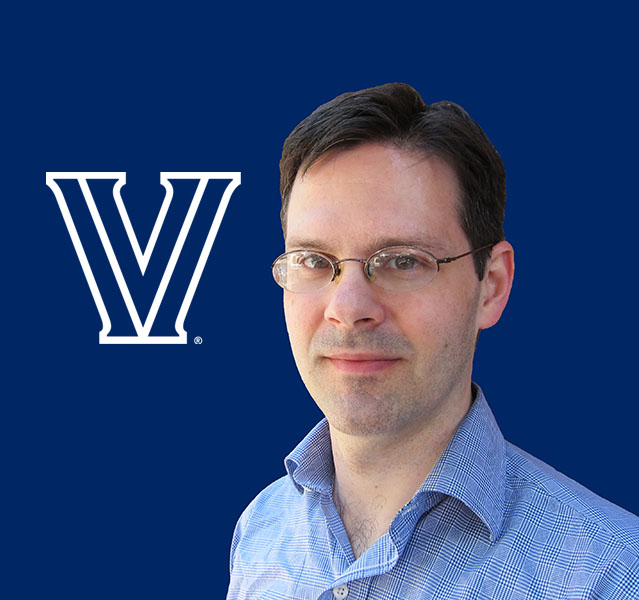Villanova University Humanities Receives $3.9 million Templeton Foundation Grant to Explore How the Theology of Human Nature Engages with Biology and the Social Sciences
The grant marks the largest in the history of Villanova’s College of Liberal Arts and Sciences

The grant will fund a new research initiative directed by Jesse Couenhoven, PhD, a professor of Moral Theology in Villanova’s Department of Humanities and Department of Theology, and the project’s principal investigator.
Villanova, PA – Villanova University’s College of Liberal Arts and Sciences (CLAS) has received a three-year, $3.9 million grant from the John Templeton Foundation to explore how the theology of human nature engages scientific approaches to humanity. The largest grant ever received by CLAS, it will fund a new research initiative, “Collaborative Inquiries in Christian Theological Anthropology,” directed by Jesse Couenhoven, PhD, a professor of Moral Theology in Villanova’s Department of Humanities and the Department of Theology, and the project’s principal investigator.
The interdisciplinary effort, supported by nearly $700,000 in additional contributions from Villanova, the University of Notre Dame, and 12 other colleges and universities, will explore how the theology of human nature engages with biology and the social sciences. Its primary goal is to nurture ambitious, science-engaged theological scholarship that addresses topics such as human flourishing, moral agency, freedom and the development of virtue.
The research project’s co-investigators are Gerald McKenny, PhD, Walter Professor of Theology at the University of Notre Dame, and Neil Arner, PhD, assistant professor of Theology at the University of Notre Dame. The grant will fund a team of more than 30 fellows, mentors and educational advisors to collaborate on long-term research projects. Institutions represented include faculty from Boston College, Cambridge University, Princeton Theological Seminary, University of St. Andrews, Wake Forest University and Yale University, among others. Activities will include six summer and winter workshops, through which the grant’s 15 researchers will learn from distinguished experts in a variety of fields and refine their work-in-progress. The grant will also sponsor numerous other presentations, publications and collaborations.
“This grant offers us a rare opportunity to develop new ways of relating religion and science, while exploring vital questions about what it means to live a good human life,” noted Dr. Couenhoven. “Such significant funding for interdisciplinary theological research is extremely unusual.”
The John Templeton Foundation serves as a philanthropic catalyst for discoveries relating to the deepest and most perplexing questions facing humankind—encouraging civil, informed dialogue among scientists, philosophers, and theologians, as well as between such experts and the public at large.
“Villanova is extremely proud that Dr. Couenhoven is leading the investigation of this critical topic,” said Amanda Grannas, PhD, associate vice provost for Research and Chief Research Officer. “This work is aligned with our institutional mission and belief that between true science and true religion there is no intrinsic conflict. This project will find new ways of relating religion and science, which ultimately will significantly benefit humanity.”
Dr. Couenhoven’s teaching covers a wide range of issues in ethics, theology and philosophy. His research interests include the topics of free will, personal responsibility, theories of punishment, doctrines of grace, predestination, forgiveness and ethical theory. He is the author of two books, Predestination: A Guide for the Perplexed (T & T Clark, 2018) and Stricken by Sin, Cured by Christ: Agency, Necessity, and Culpability in Augustinian Theology (Oxford University Press, 2013). Dr. Couenhoven received his doctorate in Religion from Yale University.
About Villanova University’s College of Liberal Arts and Sciences: Since its founding in 1842, Villanova University’s College of Liberal Arts and Sciences has cultivated knowledge, understanding and intellectual courage for a purposeful life in a challenging and changing world. With 39 majors across the humanities, social sciences and natural sciences, it is the oldest and largest of Villanova’s colleges, serving more than 4,500 undergraduate and graduate students each year. The College is committed to a teacher-scholar model, offering outstanding undergraduate and graduate research opportunities and a rigorous core curriculum that prepares students to become critical thinkers, strong communicators and ethical leaders with a truly global perspective.
About Villanova University: Since 1842, Villanova University’s Augustinian Catholic intellectual tradition has been the cornerstone of an academic community in which students learn to think critically, act compassionately and succeed while serving others. There are more than 10,000 undergraduate, graduate and law students in the University's six colleges—the College of Liberal Arts and Sciences, the Villanova School of Business, the College of Engineering, the M. Louise Fitzpatrick College of Nursing, the College of Professional Studies and the Villanova University Charles Widger School of Law. Ranked among the nation’s top universities, Villanova supports its students’ intellectual growth and prepares them to become ethical leaders who create positive change everywhere life takes them. For more, visit www.villanova.edu.
